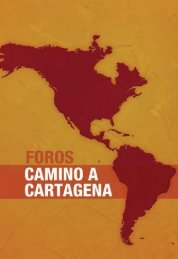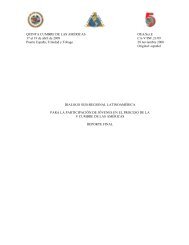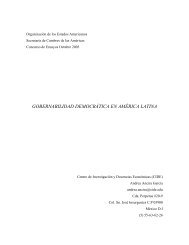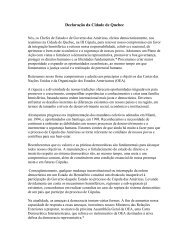The Road to Hemispheric Cooperation: Beyond the Cartagena
The Road to Hemispheric Cooperation: Beyond the Cartagena
The Road to Hemispheric Cooperation: Beyond the Cartagena
Create successful ePaper yourself
Turn your PDF publications into a flip-book with our unique Google optimized e-Paper software.
PublIC SECuRITy CHAllENgES IN THE AMERICAS<br />
Kevin Casas-Zamora* I Secretary for Political Affairs at <strong>the</strong> Organization of American States<br />
Lucía Dammert * I Professor at <strong>the</strong> Universidad de Santiago de Chile and Fellow at <strong>the</strong> Woodrow Wilson International<br />
Center for Scholars<br />
Executive Summary<br />
●● Latin America remains one of <strong>the</strong> most violent regions<br />
in <strong>the</strong> world—by some measures <strong>the</strong> most violent one.<br />
During <strong>the</strong> past decade alone, 1.4 million people in Latin<br />
America and <strong>the</strong> Caribbean (LAC) lost <strong>the</strong>ir lives as a result<br />
of violent crime.<br />
●● If murderous violence affects Latin American countries<br />
in different ways, its impact is also diverse across<br />
<strong>the</strong> various socio-demographic groups. Particularly<br />
worthy of mention is <strong>the</strong> high concentration of regional<br />
homicide victims among men between 15 and 29<br />
years of age, whose homicide rate in LAC (89.7 per<br />
100,000) is nearly five times higher than <strong>the</strong> global<br />
figure (19.4 per 100,000).<br />
●● <strong>The</strong> perception that state authorities are unable <strong>to</strong> protect<br />
<strong>the</strong> citizens’ most fundamental rights is visibly damaging<br />
<strong>the</strong> support for democratic institutions in LAC and creating<br />
a breeding ground for authoritarian attitudes.<br />
●● Fear of crime has become a unique social problem that<br />
directly impacts quality of life of most Latin Americans<br />
by limiting <strong>the</strong>ir activities and increasing expenditures<br />
on private security.<br />
●● <strong>The</strong> state is not responding effectively. In fact, <strong>the</strong> acute<br />
problems of effectiveness and integrity of <strong>the</strong> police and<br />
<strong>the</strong> courts in Latin America are well known.<br />
●● In general LAC countries do not have criminal justice systems<br />
but a complex network of institutions with few col-<br />
laborative practices. Fur<strong>the</strong>rmore, <strong>the</strong>re is a clear lack of<br />
informational systems that would allow for a better policy<br />
design process.<br />
●● In order <strong>to</strong> understand <strong>the</strong> magnitude of <strong>the</strong> broad criminal<br />
violence phenomenon in LAC, one must take in<strong>to</strong> account<br />
at least <strong>the</strong> following fac<strong>to</strong>rs: highly unequal income distribution,<br />
youth marginalization, widespread urbanization,<br />
proliferation of guns, pervasive presence of organized<br />
crime, and weakness of law enforcement institutions.<br />
●● Confronting public insecurity in <strong>the</strong> hemisphere demands<br />
efforts at <strong>the</strong> local, national, regional and hemispheric<br />
levels. <strong>The</strong>se efforts should include <strong>the</strong> fight<br />
against transnational drug trafficking as an important<br />
element, though not <strong>the</strong> centerpiece of <strong>the</strong> strategy.<br />
An international cooperation agenda that focuses on<br />
tackling structural fac<strong>to</strong>rs that generate and reproduce<br />
criminal violence, ra<strong>the</strong>r than simply on controlling<br />
crime, is essential for progress.<br />
●● A number of areas are particularly ripe for policy intervention<br />
and cooperation at <strong>the</strong> hemispheric level:<br />
Reframing <strong>the</strong> discussion. This means resisting<br />
appeals <strong>to</strong> fighting crime through iron-fisted methods<br />
that almost always fail <strong>to</strong> reduce crime rates<br />
but never fail <strong>to</strong> undermine basic civil rights.<br />
Developing robust indica<strong>to</strong>rs. <strong>The</strong>re is an urgent<br />
need <strong>to</strong> develop better public safety indica<strong>to</strong>rs that<br />
would allow for more informed diagnoses and policy<br />
decisions.<br />
* Kevin Casas-Zamora is currently <strong>the</strong> secretary for Political Affairs at <strong>the</strong> Organization of American States (OAS). Lucía Dammert is a<br />
professor at <strong>the</strong> Universidad de Santiago de Chile and Fellow at <strong>the</strong> Woodrow Wilson International Center for Scholars. This article was<br />
written when Mr. Casas-Zamora was senior fellow in Foreign Policy at <strong>the</strong> Brookings Institution. This article in no way reflects <strong>the</strong> position<br />
of <strong>the</strong> OAS or anyone o<strong>the</strong>r than <strong>the</strong> co-authors.<br />
<strong>The</strong> <strong>Road</strong> <strong>to</strong> <strong>Hemispheric</strong> <strong>Cooperation</strong>: <strong>Beyond</strong> <strong>the</strong> <strong>Cartagena</strong> Summit of <strong>the</strong> Americas<br />
<strong>The</strong> Brookings Institution ❘ Latin America Initiative<br />
59








